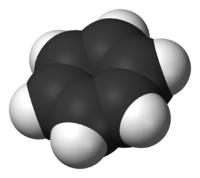
Photo from wikipedia
BACKGROUND Polycyclic aromatic hydrocarbons (PAHs) are ubiquitous environmental and occupational pollutants. To date, the effect and mechanism by which PAHs exposure impaired hematopoietic system remains unclear. METHODS We examined the… Click to show full abstract
BACKGROUND Polycyclic aromatic hydrocarbons (PAHs) are ubiquitous environmental and occupational pollutants. To date, the effect and mechanism by which PAHs exposure impaired hematopoietic system remains unclear. METHODS We examined the capability of PAHs to disrupt hematopoiesis in a study of 639 male participants in China by measuring complete blood counts (CBC) in 2013 and 2014. Gas chromatography-mass spectrometry (GC/MS) method was used to measure airborne levels of PAHs and benzene. We measured 1-hydroxypyrene (1-OHP), S-phenylmercapturic acid (SPMA) and 8-hydroxy-2'-deoxyguanosine (8-OHdG) in urinary by ultra-high performance liquid chromatography-mass spectrometry (UPLC-MS/MS) method. RESULTS We found decreased dose-response of white blood cells, eosinophils, monocytes and lymphocytes with increased PAHs exposure in two consecutive years. We did not find association between benzene with CBC in our study. After stratification analysis by smoking status, the findings were highly consistent. White blood cells, monocytes and red blood cell counts were decreased in high urinary 8-OHdG group. CONCLUSIONS Our study showed that PAHs could impair the hematopoietic system independently, and oxidative stress might play an important role in potential hematotoxicity.
Journal Title: Toxicology and applied pharmacology
Year Published: 2019
Link to full text (if available)
Share on Social Media: Sign Up to like & get
recommendations!